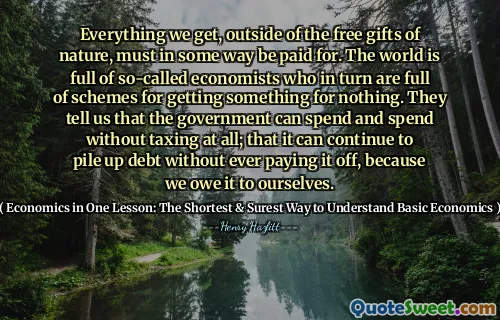
Everything we get, outside of the free gifts of nature, must in some way be paid for. The world is full of so-called economists who in turn are full of schemes for getting something for nothing. They tell us that the government can spend and spend without taxing at all; that it can continue to pile up debt without ever paying it off, because we owe it to ourselves.
This quote touches on a fundamental truth in economics and fiscal policy: nothing of value comes without a cost, except the natural gifts that nature generously provides for free. It highlights the dangers of economic fallacies often propagated by some who claim that governments can endlessly spend without consequence, accumulating debt under the assumption that it's merely owed to oneself and therefore doesn't require repayment. Such thinking overlooks the real implications of debt — it must eventually be serviced and paid through taxes, reduced public services, or inflation, which ultimately affect everyone. The quote warns against the seductive but misguided notion of obtaining benefits without a corresponding cost, a concept that can lead to irresponsible fiscal behaviors and economic instability. In modern contexts, this perspective is especially relevant when discussing national debt, government spending, and economic policies meant to stimulate growth or provide social services. The author, Henry Hazlitt, renowned for his ability to distill complex economic principles into understandable lessons, forces us to consider the cause and effect chains behind economic actions. In essence, the quote challenges the reader to confront the reality that economic fairness and sustainability require accountability and that attempts to circumvent these principles usually come with hidden costs or delayed consequences. It serves as a reminder that sound economics must honor the principle of paying for what we consume and understand the long-term impact of fiscal decisions.


